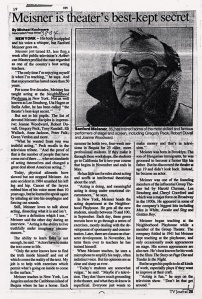Last week I wrote about presence. As in, Presence. About fighting what’s true in the moment and killing any chance of being who we really are because we’re…fighting what’s true in the moment.
There is nothing more important than living in the danger of the moment. Its uncertainty. Its vulnerability. Its complete unpredictability.
I’m repeating myself on purpose, because this is the crucible of acting we all seek to avoid, EVEN WHEN WE KNOW WE DON’T WANT TO AVOID IT. And I’m repeating myself because I believe the next biggest mistake is in preparing for auditions. And while it’s true that a surprising number of actors don’t prepare enough, it’s even more true that most of us use the wrong preparation.
What is the wrong preparation?
Deciding how to say the lines.
It’s probably better to under-prepare than to decide how every line should be said and then deliver those decisions. My friend, Don Foley, used to do any co-star audition as an improvisation–he barely looked at the lines, let alone memorized them. He thought it was fun to throw himself into it, using his real self, and learn the lines as he went.
He booked, a lot.
So if the wrong preparation is about line readings, what is the right preparation?
Well, that’s a class–to really talk about preparing every aspect of walking into and then taking the room. But the start is:
1) Figure out what kind of role it is. What does the role serve? What is the function of the character?
2) If it’s supporting, guest star, or leading role, the next step is to really delve into how you identify with the character, and then start to replace the people and events they talk about with people and events from your life, so that everything is as real and specific as possible.
The biggest mistake actors make is in deciding how to say the lines instead of creating a world that is emotionally rich.
3) For co-star roles, the opposite is true. To create too much for a one or two-liner means you’ll steal focus, and it also means you don’t understand what your role is for (always to support someone or something else). For co-star roles, the prep is to not act, and just do it as you would in life in a similar situation.
And with this, and all other prep, the job is then to go in, tell the emotional truth of your body and the moment (in your tone, in your emotions, in your personality), trusting that the understanding you’ve developed will filter in as it should.
Like I said, a start. Presence is dependent on truth, and that means allowing yourself to experience your nervousness or any other feeling. Preparation is about bringing yourself into the role…either by not acting, or by the most profound identification you can find.
Go forth and act!
And if you want to learn more, Uplevel Your Auditions is coming this fall. Email meisnerclasses@gmail.com if you’d like to get on the email list.

